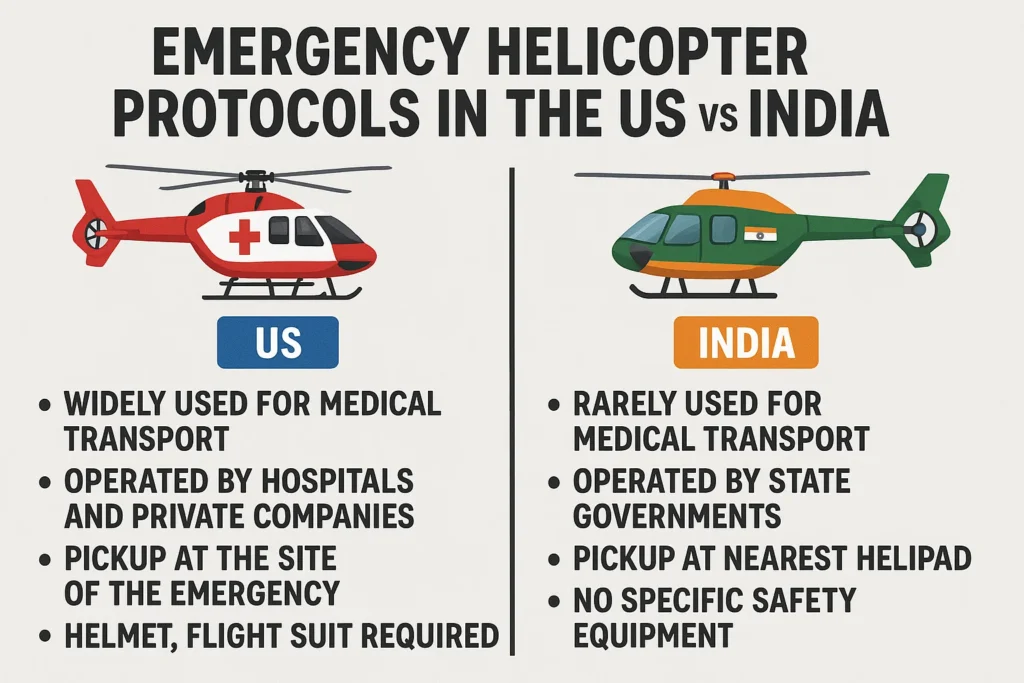🛫 Introduction: A Life-Saving Mission, Two Very Different Systems
When emergencies strike — be it accidents, natural disasters, or critical medical cases — helicopters become a lifeline. But how they’re deployed, funded, and managed varies dramatically between countries.
This article compares emergency helicopter protocols in the US vs India, helping travelers, planners, and emergency professionals understand the strengths and limitations of both systems in 2025.
⚖️ 1. Regulatory Authority & Framework
| Aspect | 🇮🇳 India | 🇺🇸 USA |
|---|---|---|
| Governing Body | DGCA, State Disaster Agencies | FAA, FEMA, NTSB, and private EMS groups |
| Policy Access | Manual & case-based | Standardized and tech-integrated |
Verdict: The US has a well-integrated multi-agency approach, while India often handles emergencies on a case-by-case basis.
🏥 2. Medical Evacuation Systems (Medevac)
| Aspect | 🇮🇳 India | 🇺🇸 USA |
|---|---|---|
| Service Providers | Private firms, hospitals, air ambulance NGOs | Nationwide network of EMS-certified providers |
| Cost to Patient | ₹1.5–₹6 Lakhs (often out-of-pocket) | Insurance-covered or partially reimbursed |
| Availability | Limited to metro cities | Available in most states, even rural areas |
Verdict: The US offers wider access and affordability due to integration with health insurance systems.
🌪️ 3. Disaster Relief & Rescue Missions
| Disaster Type | 🇮🇳 India | 🇺🇸 USA |
|---|---|---|
| Floods, Cyclones | NDRF + State Helicopters | FEMA + National Guard + Coast Guard |
| Forest Fires | IAF and state-deployed | Dedicated firefighting helicopters |
| Earthquake/Rescue | Ad-hoc deployment | Rapid-response systems + 911 activation |
Verdict: The US maintains specialized, rapid-reaction units. India relies on military or limited civilian fleets.
📞 4. Emergency Call & Dispatch Protocol
| Step | 🇮🇳 India | 🇺🇸 USA |
|---|---|---|
| Emergency Number | 112 (may not dispatch air rescue) | 911 (air support dispatched if required) |
| Time to Dispatch | 45–90 mins average | 15–30 mins average |
| Coordination | Local police + hospitals | Central EMS + fire + police + air dispatch |
Verdict: The US offers faster, integrated dispatch systems with real-time GPS and ATC clearance.
🚁 5. Air Traffic Clearance & Landing Permissions
| Factor | 🇮🇳 India | 🇺🇸 USA |
|---|---|---|
| ATC Delay | Often delayed during non-military ops | Prioritized in emergencies |
| Night Flying | Limited; depends on IFR certification | Allowed; all EMS aircraft are IFR-ready |
| Helipad Access | Mostly at hospitals, private fees | Hospital, public land, highways |
Verdict: The US system supports 24/7 air medical ops, while India still struggles with infrastructure bottlenecks.
🧑✈️ 6. Crew & Aircraft Standards
| Specification | 🇮🇳 India | 🇺🇸 USA |
|---|---|---|
| Medical Crew | Often paramedics + 1 doctor | Certified EMS crew + flight nurse |
| Aircraft Type | Bell 407, Dhruv ALH | EC135, AW109, Bell 429 |
| Training & Simulation | Growing in private firms | Mandatory across all EMS operators |
Verdict: The US has standardized crew training & aircraft types optimized for emergency roles.
💵 7. Cost, Insurance & Transparency
| Cost Element | 🇮🇳 India | 🇺🇸 USA |
|---|---|---|
| Transparency | Not publicly listed | Regulated billing by service providers |
| Government Coverage | Rare, mostly self-pay | Often covered by insurance + federal aid |
| NGO or Subsidy Options | Yes (e.g., GVK-EMRI, FlyNurse) | Yes, especially rural aid funds |
Verdict: In India, costs are a major barrier unless pre-insured; the US has structured billing and support systems.
🧭 Summary Comparison: US vs India Emergency Helicopter Protocols
| Category | India 🇮🇳 | USA 🇺🇸 |
|---|---|---|
| National Coverage | ❌ Limited | ✅ Extensive |
| Public Integration | ❌ Fragmented | ✅ Centralized (911/EMS) |
| Affordability | ❌ Expensive | ✅ Often covered by plans |
| Crew & Aircraft Quality | ⚠️ Varies | ✅ High standard |
| Real-Time Dispatch Tech | ❌ Limited | ✅ Fully integrated |
🔗 Useful Links – DreamSafar.in
🌐 External Resources
❓ FAQ: Emergency Helicopter Protocols
❓ Can anyone in India call for a helicopter ambulance?
Yes, but availability is limited and usually private. You’ll need to contact providers like Air Ambulance India or FlyNurse.
❓ How long does it take to get air support in a US emergency?
In major areas, 15–30 minutes is the average response time, triggered via 911 dispatch.
❓ Is emergency helicopter service covered by insurance?
In the US: Yes, most private and public insurance plans cover it.
In India: Rarely, unless you have specialized coverage.
❓ Are helicopter services used in India for disasters?
Yes. The Indian Air Force, NDRF, and state governments use helicopters for rescue, food drops, and evacuations, especially during floods and cyclones.
🏁 Final Thoughts
Both the US and India use helicopters in emergencies, but the scale, accessibility, and speed differ widely. The US runs a centralized, tech-savvy emergency air system, while India is still developing infrastructure and integration.
At DreamSafar.in, we advocate for expanding India’s air emergency capacity — especially in rural, disaster-prone, and traffic-heavy zones — where helicopters can truly save lives.


